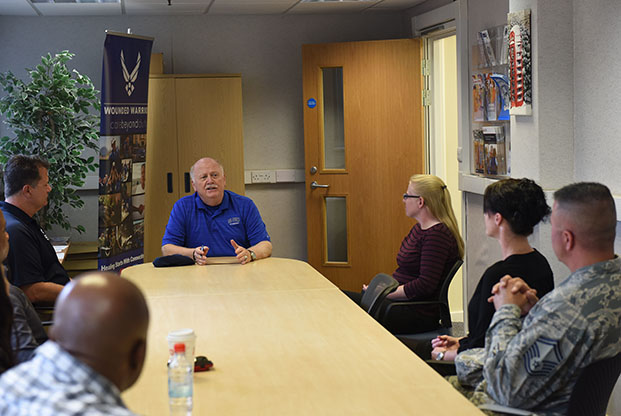
Jay Hone, shown here in a July 2018 meeting with Wounded Warrior Program representatives at RAF Mildenhall, England, discussed?? licensure issues faced by military spouses during a Sept. 18 panel at AFA's Air, Space & Cyber Conference in National Harbor, Md. Air Force photo by SrA. Luke Milano?.
Transferring occupational licenses—for jobs such as realtors, mental health counselors, or cosmetologists—from one state to another remains a big problem for military spouses, the 2018 Air Space & Cyber Conference was told, despite legislation enacted by dozens of states.
“There’s a lot of work to be done” on the issue, Jay Hone, spouse of Air Force Secretary Heather Wilson, told a USAF town hall gathering Tuesday.
The average service family moves every one to three years, said Melinda Manyx, an official with the Department of Defense’s Transition to Veterans Program Office. She would know. Herself a military spouse, her family has moved 11 times during her husband’s 22 year career, she told Air Force Magazine on the sidelines of a panel discussing the issue.
Between so many moves and the long deployments many service families endure, it’s often hard for military spouses to develop their own career.
“It’s difficult when you move from state to state and [state licensing authorities] want transcripts from 20 years ago or they want test scores … and it has to be the original,” she explained.
In 2011, the Defense Department, through its State Liaison Office, instituted a campaign to get state legislatures to pass laws expediting the licensing process for military spouses who were licensed in another state. Many did so, but a study last year by the University of Minnesota found that the legislation had not been implemented evenly or well.
?“While the laws were well intended,” Manyx said, “They were not effective. … It didn’t solve the problem.”
As an alternative, DOD “decided to go grassroots” and approach state licensing boards directly. The boards have been getting together with their counterparts across the country to put multistate compacts into place, which define basic minimum requirements for licensure and require states that sign up to agree to honor each other’s licensing.
“Not every state has done this and it’s a kind of a slow grow,” Manyx said. She added such compacts were now in place for nurses, physical therapists, and emergency medical technicians. “The conversations have started” for other professions like mental health counselors, cosmetologists, and realtors, she concluded.

